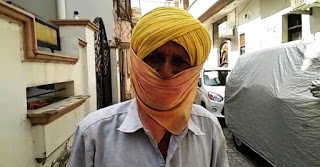
Amir Chand – Rich by name but poor in pocket because of Covid-19
Tale of rickshaw puller during and post curfew-lockdown in border town
Amir Chand – Rich by name but poor in pocket because of Covid-19
Amir Chand, 50-years-old, having spent a significant part of his life ferrying passengers on his rickshaw, laments the way things have changed. Though uneducated yet a few minutes talk with him, speak highly of his physical and mental sensory – has been plying rickshaw in the border town Ferozepur for the last 30 years. He was seen standing in the corner of the busiest crossing – Udham Singh Chowk named after martyrs Udham Singh who sacrificed his life for the freedom of India but after more seven decades of independence, the plight of people has not improved.
Before sharing the tale of a rickshaw puller, let me put you wiser in a few words about its history. A pulled rickshaw is a mode of human-powered transport by which a runner draws a three-wheeled car that seats one or two people.
The rickshaws were a convenient means of travel, able to traverse winding, narrow city streets. During monsoon season, passengers might be carried out of the carriage, above the flooded streets, to the door of their arrival. They offered door-to-door travel, unlike scheduled public bus and tram service.
In recent times the use of human-powered rickshaws has been discouraged or outlawed in many countries due to concern for the welfare of rickshaw workers. Pulled rickshaws have been replaced mainly by cycle rickshaw and auto rickshaws.
Amir Chand, after initial years of struggle, doing whatever little work came his way, he took to transporting passengers on his rickshaw in this small border town. He has been in this profession in border town Ferozepur for the last 30 years when the things were very different.
The roads were not so congested and there were fewer cars and bikes. So people were dependent on us for moving from one place to another. But now everything has changed; now we struggle to find customers on most days, said Amir Chand.
Amir is right when he said, rickshaws are considered as the only option for people to enter into the narrow street lanes which were rather impassable for other modes of transport, due to heavy water logging during monsoons.
He was seen standing in the corner of the busiest crossing – Udham Singh Chowk named after martyrs Udham Singh who sacrificed his life for the freedom of India but after more seven decades of independence, the plight of people have not improved.
There has been no change in his daily work schedule, which usually begins as early as 6’o Clock in the morning till late in the evening, with only a short break for lunch brought packed wrapped in the cloth and a quick nap around noontime under the shadow tree on the rickshaw itself.
During the curfew-lockdown period, all were confined to the four walls of the home. While the middle and upper class families had easily managed the household affairs during this period but families like of Amir Chand’s profession and daily wagers, laborers who were solely dependent on daily earnings had been more miserable if the distribution of ration by the government and regular distribution of food by the various social organizations had not come forward to help them.
Coming on the road after more than two months period, Amir Chand in his choked voice said, I made ‘zero-money’ during the lockdown period. Whatever we have kept, repeated a small amount for the rainy season, has exhausted.
For us, things are not yet normal because of the movement of buses and trains as we hardly get any passenger by waiting for a number of hours in the scorching heat with high temperature.
Sharing his old days, Amir Chand said, I used to earn Rs.200-300 per day when the starting point and terminal point for all the buses was at Ferozepur City Bus Terminal but with setting up of Cantonment Board stand, all long route buses don’t pass through the City bus stand, putting a great loss to our class. I have to pay a daily rental of around Rs.30 for the rickshaw but with the passage of time the value of money has also decreased, he rued.
Wiping his face and blinking eyes were saying more than the words from his mouth perhaps cursing the system which has not improved the conditions of poor people who are still sailing in the same boat of 1947.
However, now, his passengers are far and few; most of them take the ride only if there is no other alternative. On one hand, while social critics have been calling for the ban of this mode of transport — pulled by one human being for another — even common people have been avoiding the usage of this mode more on compassionate grounds. However, sometimes I am called by the owner of a store to deliver the goods in certain specific areas and established a mark of honesty.
Amir Chand was seen murmuring something – as if asking a question to him – will the governments think of improving the condition of class like ours adding we don’t have funds to give higher education to our children. What to say, our family doesn’t have television even.
India has entered into 73rd year of Independence but people like Amir by name are still struggling to become ‘amir’ – rich to earn a decent living. Governments come and go; but very little change comes into our lives, said Amir, adding in a low tone to make virtual policies poor by cutting down the unwanted expenditures in crores on making statues.



